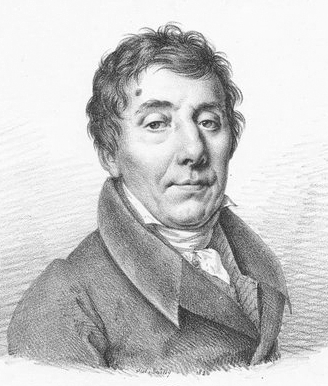 |
| 1754-1840 |
We've looked at few examples of liberal political thinkers, who have believed in the possibility to consciously and rationally plan the human societies and thus make further progress in human condition. One result of French Revolution was the emergence of an ideology opposed to such liberal philosophies – one that aimed for restoration and conservation of traditional societies. One example of this conservative ideology was de Bonald's Theorie du Pouvoir Politique et Religieux dans la Societe Civile Demontree par le Raisonnement et l'Histoire.
De Bonald's idea of a good society is based on his notion of human beings as essentially dual persons, with intertwined physical and mental or spiritual aspects. Thus, he divides human societies into two kinds: political, in which the physical aspect preponderates, and religious, in which spiritual aspect preponderates. Although these societies have their differences, because they serve essentially different ends, more interesting are the analogies and similarities de Bonald finds between the two societies.
The first important element in de Bonald's view of societies in general is that he believes societies to naturally incline to some necessary, lawful customs. These customs might vary from one society to another, just because the people in these societies are different (de Bonald appears to suggest that this difference is more due to heritage than environment of the people). The customs or laws represent the true universal will of that society – they are not willed by the collection of the individual persons, but in a sense, by the organic unity formed by the interaction of these persons.
The purpose of both political and religious powers is then to conserve these natural laws, de Bonald says. In essence, no progress is required, once the society has found its natural course, and all that is required is that the conservation should happen as efficiently as possible. This requires then that the conserving force of the society must be as great as possible and embodied in one individual: pope, in the case of religious society (or actually God, but even he must have a single representative on worldly plane), and monarch, in the case of political society.
Of course, this monarchic constitution is not meant to be despotism based on mere whims of one person – monarch does not so much make laws that suit him, but just defends existing laws. He does need executive power to effect his role and thus arises the need for various people that help the monarch (priests in case of religious society and nobility in case of political society). Hence, de Bonald explains the necessity of the two estates, while the third estate seems to him a mere afterthought and not an essential requirement of a good society.
It is then no wonder that it is the medieval France which de Bonald holds to be an epitome of a good society. He is quite certain that monarchic France has never really aimed at anything else, but preserving status quo both internally and externally – the only exception he accepts is Louis XIV, although even he could only round French territory with few natural additions. It appears de Bonald has completely forgotten that kings of France had over the centuries engaged in various internal and external conflicts, stealing power from the nobles of their own land, attempting to conquer territories in Europe and in other continents and even attacking the pope, leader of the faith they supposedly also protected.
In contrast to monarchic France, the ideal of all liberals or the constitution of England is seen in an ambiguous light. De Bonald suggests that while usually in monarchies powers cannot and shouldn't be divided, England makes an exception, because it is not an organic unity, but a combination of two societies. One of them is a regular monarchy, while the other is a society of commerce, represented by the parliament. De Bonald is quick to point out that this combination is quite volatile – economical progress makes conserving the traditional feudalistic society difficult.
The worst kind of society in de Bonald's eyes is one that is set up not on any necessary laws, but on arbitrary decisions of individuals – no matter whether of a single individual (in despotism) or of a supposed combination of all individuals (in republic). De Bonald insists especially that a mere vote is not sufficient for finding out Rousseau's ”general will”. The biggest problem for de Bonald is that republic can never really take into account will of every individual, but its decisions always represent the interests of only one faction. In a somewhat tendentious fashion, de Bonald suggests that republics have a habit of starting wars with other countries, that internally they are in danger of slipping into pure anarchy and that from a religious aspect they fall to atheism.
Ei kommentteja:
Lähetä kommentti